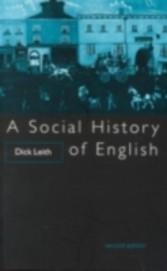
A Social History of English

von: Mr Dick Leith, Dick Leith
Routledge, 1997
ISBN: 9780203992869
Sprache: Englisch
280 Seiten, Download: 4095 KB
Format: PDF, auch als Online-Lesen
3 Words and meanings (p. 51-52)
Contact with other languages, as we saw in chapter one, has greatly influenced the word-stock of English. New words are more easily added to a language than grammatical forms or structures, or sounds, and so the word-stock of a language, or its lexicon, can be considered to be more open-ended than its grammar or sound-system. Social and cultural changes are accordingly clearly reflected in changes in vocabulary: and this is one aspect of the history of English about which it is possible to make some simple, clear, and fairly safe observations. We know, for instance, that the vocabulary of English has vastly increased in size during the last 1500 years, as an accompaniment to the process of functional elaboration discussed in chapter two. In the present chapter we shall examine the process of word-borrowing, and some sociolinguistic issues raised by it, such as how it might reflect social needs, and this in turn will lead us to further issues, such as the ways in which our notion of the word as an isolable unit has been shaped by literacy and the dictionary. We shall need to look at the complexity involved in the study of meaning (and again, the way in which our perceptions are influenced by the dictionary), and consider how many traditional accounts of semantic change tend to underplay the importance of different groups of users in changing meanings, or in adding new meanings to particular words. We shall try to illustrate the role of these factors by considering in detail three recent examples of semantic change. Finally, we shall explore parts of our vocabulary which can be shown to have been socially sensitive, by discussing the notion of ‘keywords’, the vocabulary of power and status, terms of address, and words which refer to women.
From a social point of view, more interesting than the mere addition of new words to our vocabulary is the change in the character of our word-stock, from one which can be called Germanic to one that is also partly Romance. Exposure to Latin, and its offspring French, has been sustained throughout much of the recorded history of English, and it is this that helps give the language its European flavour, in that many of our words are quickly recognisable to speakers of French, Italian, and Spanish. This exposure has been pervasive enough to give rise to some popular notions and stereotypes about parts of the English lexicon. Speaking ‘in words of one syllable’ appeals to the Anglo-Saxon element (the reason for this monosyllabic quality, the loss of inflexions, is discussed in the next chapter), ‘talking like a book’, to the more learned, polysyllabic lexical material derived from the Romance languages. Like most popular ideas about language, these associations are only partly justified: ‘four-letter words’, for instance, are not generally recorded in Anglo-Saxon texts, and there are plenty of words from French that have entered dialectal English and have rarely been used in writing. But these associations do square with an important stylistic trait in the language. Romance loan-words are common in domains associated with power and prestige, and it is a matter of everyday experience that formal business letters tend to favour the French request rather than the Anglo-Saxon ask, and that military medals are awarded for gallantry or courage, rather than for guts (deriving from an Anglo-Saxon word denoting bowels and entrails). There have also been fundamental developments in the principles of word formation. In Anglo-Saxon times, new words could be coined from established ones, a process generally known as compounding. There were some productive prefixes, such as for-, under-, mis-, and suffixes like -some, -craft, -dom, and - ness, and these could be combined in various ways with other words: thus, poetry was wordcraeft, medicine laececraeft. The technique is similar to that often found in modern German, which might have Ausgang (‘way out’) where we are likely to use the Latinate Exit. While we have not abandoned this technique altogether, it has often been said that English has been particularly receptive to the possibility of absorbing foreign words, as well as making up new words, we borrow them, and not only, of course, from the languages mentioned. On this view, the borrowing process has been so dynamic that we have taken up prefixes and suffixes as well as words: the French -able, for instance, can be tacked on to words of Anglo-Saxon origin, for instance, as in likeable.
The tendency to borrow rather than create has its social consequences. It has been argued that the Anglo-Saxon habit of word-formation kept the meaning of a word transparent and was therefore democratic: you can work out what a new word means, because you know the meanings of the parts. It is certainly true that foreign vocabulary has often been used, and is still used, to dominate or mystify, and it is easy to laugh at people who, unfamiliar with the sound- and syllablepatterns of the Latinate vocabulary of, say, medicine, mispronounce words or use them inappropriately. On the other hand, can words in themselves exemplify either a democratic or an undemocratic trend in a language’s development? The desire to be either of these things must be in reality a matter for the users of a language.
Indeed, when it comes to demagogy, it is just as possible to manipulate people by using words drawn from a less heterogeneous vocabulary. The meanings of Anglo-Saxon words like hearth, home, kith, kin, child, father, mother, can easily be exploited in persuasive language, since they are words to which strong emotions are often attached, often learned early in life, some resonate with associations of familiarity and intimacy.







